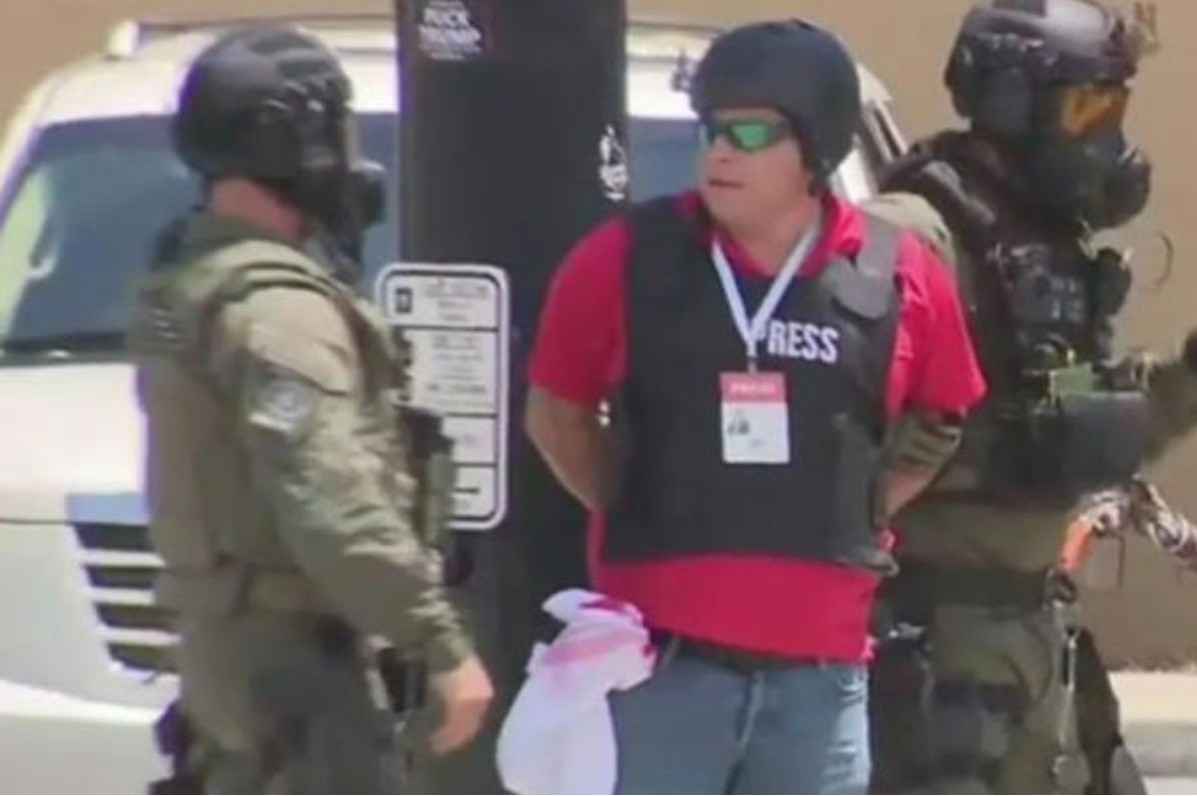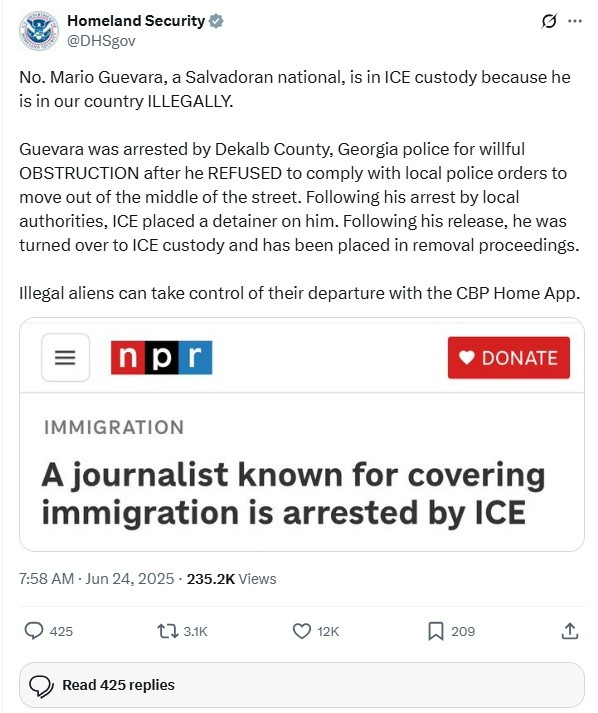WASHINGTON, Jun 25, 2025 (Freedom Person)
Mario Guevara, a veteran journalist and immigration reporter originally from El Salvador, is facing possible deportation after being arrested while covering a protest in Georgia on June 14, 2025. Despite living and working legally in the United States for more than 20 years, Guevara is now in federal immigration detention, raising serious concerns about press freedom, due process, and the targeting of immigrant journalists.

Arrest While Reporting
Guevara was reporting on the “No Kings” protest, an anti-ICE and anti-Trump demonstration in DeKalb County, Georgia, when he was detained by local law enforcement. Wearing a press vest and livestreaming to his large Spanish-speaking audience, Guevara was arrested by police on charges of obstruction, unlawful assembly, and improperly entering a roadway.
Video footage captured the moment he was arrested. Standing on a sidewalk beside other reporters, Guevara filmed police officers in riot gear as they approached. “I’m a member of the media, officer,” he said moments before being placed in handcuffs. He was clearly identified as press, wearing a red shirt under a black vest labeled "PRESS" across the chest.
After being booked into the DeKalb County Jail, Guevara was granted bond by a local judge. But instead of being released, he was held for an additional 48 hours at the request of U.S. Immigration and Customs Enforcement (ICE), which issued a detainer seeking custody.

From Jail to Immigration Custody
Guevara is now being held in a federal immigration detention facility. ICE claims he is in the country “illegally,” a statement that his legal team strongly disputes. According to his attorney Giovanni Diaz, Guevara entered the U.S. legally in 2004 on a journalist visa after fleeing threats in El Salvador related to his work as a political reporter. He currently has legal work authorization and is awaiting adjudication of his green card application, which is based on sponsorship by his adult son, a U.S. citizen.
“He has built his life here,” Diaz told reporters. “This is not just a matter of immigration law — this is an attempt to silence a voice that holds power to account.”

U.S. Immigration and Customs Enforcement (ICE) posted on X (formerly Twitter) a firm statement declaring that Mario Guevara, a Salvadoran national, remains in their custody because he is in the United States illegally. ICE explained that Guevara was arrested by DeKalb County police for willful obstruction after refusing to comply with orders to move out of the street. After his arrest, ICE placed a detainer on him, and upon his release from local jail, he was transferred into ICE custody and placed in removal proceedings.
Press Freedom Under Threat
The arrest and subsequent ICE detention of Guevara have drawn condemnation from press freedom organizations across the U.S. and abroad. The Committee to Protect Journalists (CPJ), PEN America, the Atlanta Press Club, and Reporters Without Borders have called for his immediate release, warning that the criminalization of journalism sets a dangerous precedent.
“This is a journalist with a long record of public service and investigative reporting who was clearly performing his duties,” said a joint statement from several press organizations. “Equating his presence at a protest with criminal conduct — and then triggering deportation — sends a chilling message.”
Guevara’s case highlights a growing pattern of journalists, especially from minority and immigrant backgrounds, facing legal threats or arrest while covering public demonstrations. Advocacy groups warn that such actions undermine First Amendment protections and discourage media coverage of protests and immigration enforcement.
A Legacy of Immigration Reporting
For over two decades, Mario Guevara has been one of the most recognized voices in Spanish-language journalism in the southeastern U.S. After working at Mundo Hispanico, Georgia’s largest Spanish-language newspaper, he launched his own platform, MGNews, which now reaches more than 780,000 followers on Facebook alone.
His reporting — often delivered live from immigration raids, protests, and detention centers — has made him a trusted source among Latino communities across the country. He has won multiple awards for his journalism and is known for his commitment to documenting the lived experiences of immigrants and holding ICE accountable.
On the day of his arrest, Guevara was covering one of many protests that erupted nationwide against the Trump administration’s renewed immigration crackdowns. While police claimed the protest threatened to block a highway on-ramp, video evidence suggests Guevara was not part of the main crowd and was recording events from a distance when detained.
Update
Guevara’s legal team has filed an urgent request for a bond hearing in immigration court and is demanding full transparency in both the criminal and immigration proceedings. They argue that his First Amendment rights were violated and that deportation would amount to retaliation for his journalism.
More than a week after his arrest, Mario Guevara remains in federal immigration detention, with his legal team urgently requesting a bond hearing. ICE continues to claim he is in the U.S. unlawfully, a statement strongly contested by Guevara’s attorneys, who have confirmed his legal entry on a journalism visa and his pending green card application sponsored by his U.S. citizen son. The case now centers on whether his detention is a matter of immigration law or a troubling attempt to suppress critical journalism.
Meanwhile, his case continues to spark outrage in press circles, immigrant rights communities, and among legal observers. Supporters have launched a campaign with the slogan “Journalism Is Not a Crime” — insisting that no reporter should face deportation for doing their job.
As Guevara remains in custody, his fate may set an important legal and political precedent: whether the United States can or will protect journalists — especially immigrant journalists — who report boldly, even in the face of institutional power.
By Vitali Ivaneko


